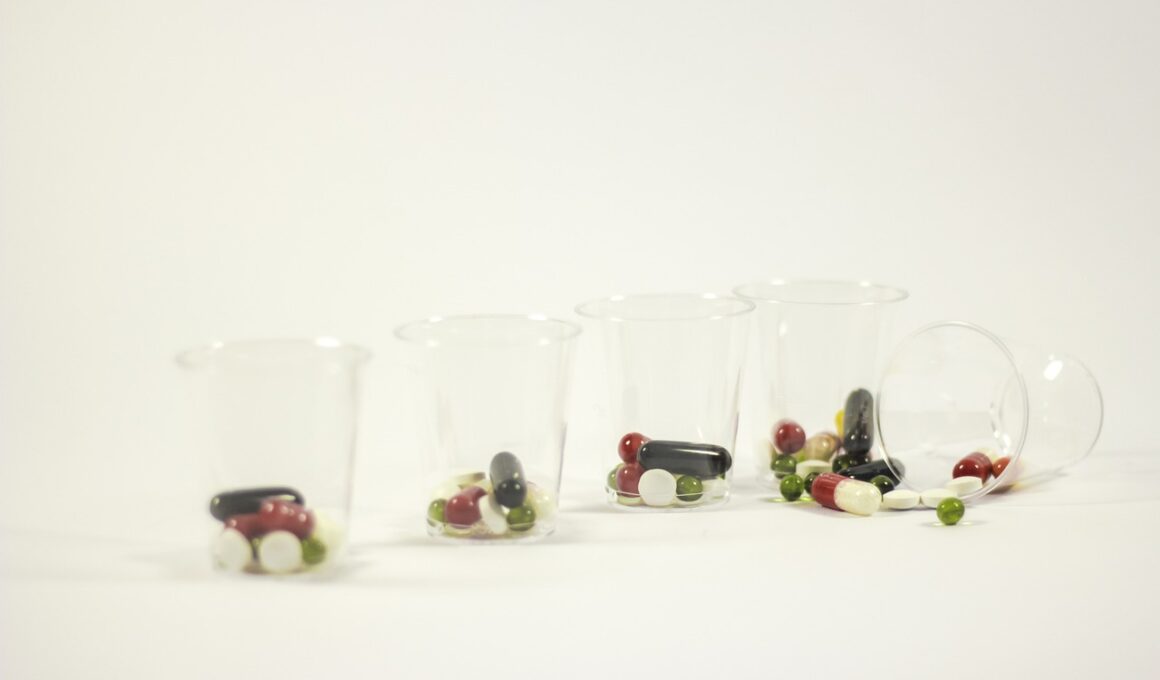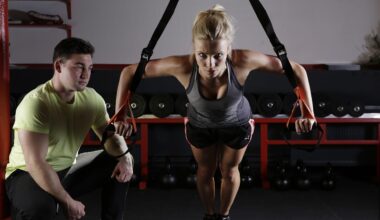The role of the placebo effect in muscle recovery continues to garner interest in both scientific and fitness communities. Placebo, a phenomenon wherein a patient experiences a perceived improvement due to their belief in treatment, can significantly impact muscle recovery, enhancing physical performance. Understanding how the mind influences physical healing is vital for athletes and patients alike. The placebo effect showcases the profound connection between mental state and physical well-being. It can facilitate faster muscle recovery, reduce pain perception, and encourage psychological resilience during rehabilitation. Numerous studies have shown that individuals who believe in the efficacy of a treatment—whether a sugar pill or sham procedure—often report better outcomes. The implications for sports medicine and physical therapy are immense, particularly when it involves training adjustments and recovery protocols. Incorporating mental conditioning techniques may improve recovery rates alongside traditional physical therapies. The blend of advanced medical techniques and mental focus cultivates a more holistic approach to healing. This article explores how the placebo effect operates, its mechanisms, and real-world applications in muscle recovery, paving the way for a new understanding of sports and wellness. The intersection of psychology and physiology merits further exploration.
Understanding the Placebo Effect
The placebo effect can be remarkable in its ability to yield tangible changes in muscle recovery processes. This effect often manifests when an athlete believes that they are receiving a potent treatment, even if it is non-active. The mind, believing in recovery, can play a crucial role in the body’s healing mechanisms. This psychological boost can lead to tangible benefits such as reduced inflammation and improved muscle function, which can be pivotal when athletes seek to return to peak performance. Neurotransmitter release triggered by positive expectations also helps mitigate pain, allowing the body to recover more effectively. Placebo responses can be observed both in clinical settings and athletic environments, highlighting the significance of an athlete’s mindset during recovery. In essence, the placebo effect serves not only as a therapeutic tool but also as a psychological strategy for overcoming injuries. Athletic training may benefit from integrating strategies that enhance belief in the treatment process. This understanding can lead to the creation of innovative programs combining both mental and physical elements to maximize recovery efficacy, illustrating the profound interaction between mindset and physical performance.
Mechanisms Behind the Placebo Effect
Research into the mechanisms behind the placebo effect reveals a multitude of factors influencing recovery outcomes. When an athlete engages in recovery with a positive mindset, their brain releases certain chemicals that aid healing. Specifically, dopamine and endorphins play essential roles in diminishing pain and promoting a sense of well-being. Studies show that these neurotransmitters contribute to muscle relaxation and improved circulation, allowing for quicker recovery after vigorous training. The anticipation of beneficial effects can trigger physical responses, paving the way for faster healing. It becomes evident that the brain functions in concert with the body to create this mind-body synergy. Furthermore, underlying psychological factors, including past experiences and individual beliefs, shape the placebo response observed in various populations. Enhancing cognitive belief in performance-related interventions can further amplify recovery rates. By utilizing both cognitive and physical strategies, sports professionals can develop targeted interventions bolstered by the placebo effect. The consistent interaction between mental processes and physical health points to the need for incorporating such evidence into clinical practices, fostering a more integrative approach to healing and performance.
The Role of Conditioning in Recovery
Conditioning emerges as a significant aspect of understanding the placebo effect concerning muscle recovery. Athletes conditioned to associate certain rituals or treatments with positive outcomes may experience pronounced placebo responses. These rituals can range from specific stretching routines to visualization techniques. The brain learns to predict recovery based on past experiences, enhancing the overall efficacy of treatment. Creating beneficial associations via conditioning helps mitigate anxiety and develops confidence in recovery processes, amplifying the placebo impact. Training regimens that incorporate mental conditioning can bolster the relationship between mind and body, allowing athletes to harness the placebo effect effectively. This can be particularly beneficial in high-pressure situations, where mental clarity directly translates to physical performance. Additionally, conscious conditioning fosters a stronger focus on achieving intended outcomes, making the healing process a proactive journey. By employing structured mental preparation alongside physical techniques, practitioners can maximize recovery potential for athletes returning from injuries. The cultivation of belief systems among athletes is thus essential for empowering their recovery journeys. Ultimately, merging mental conditioning with physical rehabilitation offers promising potential for advancing recovery protocols across various sports.
Real-World Applications in Sports
In sports, the real-world applications of the placebo effect suggest a frontier for innovative recovery methods. Coaches and sports medicine practitioners are increasingly recognizing the value of incorporating mental strategies that align with physical training. These techniques facilitate quicker recovery through improved psychological support. For instance, using positive reinforcement, guided imagery, and motivational self-talk can bolster athletes’ belief in their recovery capabilities and, consequently, improve actual recovery rates. Case studies involving mentally conditioned athletes indicate that their recovery processes were expedited compared to those who did not engage in these psychological strategies. Furthermore, sports psychologists advocate for the use of mental visualization techniques, boosting self-efficacy and reinforcing positive expectations during rehabilitation. This grassroots approach to recovery highlights the growing recognition of mental influences within sports science and medicine. By redefining recovery to include psychological factors, teams can adopt practices that maximize athletes’ performance potential. The continuous exploration of integrating psychological interventions into recovery processes stands to revolutionize traditional protocols, emphasizing the holistic nature of athlete care and rehabilitative strategies.
Challenges and Limitations
Despite the promising aspects of the placebo effect, challenges and limitations remain. One major concern focuses on the reliability and consistency of placebo responses across different individuals. While some individuals may experience significant benefits, others may see little to no improvement. This variability poses difficulties in harnessing the power of the placebo effect systematically. Additionally, over-reliance on placebo strategies without proper treatment can lead to adverse outcomes, exacerbating existing conditions rather than resolving them. Ethical dilemmas also arise when employing placebos as treatment methods, especially in the context of informed consent. Ensuring athletes fully understand the role of placebo in their treatment becomes paramount in avoiding ethical quandaries. Thus, while the placebo effect offers considerable promise, sports practitioners must navigate potential pitfalls to ensure responsible integration into recovery protocols. Balancing physical treatment with psychological strategies calls for ongoing research and targeted organizational protocols. Establishing a clearer framework can help optimize the therapeutic potential of the placebo effect while safeguarding athletes’ well-being. Sustained exploration is key to maximizing this complex interplay between belief, experience, and physical healing.
Conclusion
In conclusion, the role of the placebo effect in muscle recovery underscores the intricate connections between mental and physical health. By leveraging this phenomenon, athletes and practitioners can profoundly enhance recovery outcomes. The interplay of belief, expectations, and psychological conditioning can significantly impact healing processes. Integrative approaches combining physical therapies with mental strategies stand to redefine traditional recovery frameworks. Athletes equipped with psychological tools are better positioned to navigate the challenges of rehabilitation, ultimately leading to improved performance and resilience. Further understanding the placebo effect’s mechanisms and applications can provide valuable insights for sports professionals. Ultimately, advancing recovery practices using the mind-body connection paves the way for innovations in sports medicine. Engaging in this holistic thinking benefits not only athletes but also promotes broader applications across health and wellness sectors. The growing acknowledgment of the mind-body connection in recovery is indicative of a shift towards more comprehensive models of health. Encouraging exploration into the depths of the placebo effect can contribute to future breakthroughs in performance and recovery processes.
The Journey Forward
Looking ahead, the journey in understanding the placebo effect remains rife with opportunities for growth and research. As the field of sports medicine evolves, integrating psychological aspects will inevitably become a fundamental component of recovery frameworks, emphasizing the importance of belief systems in treatment. Future research might explore how diverse populations respond differently to placebo interventions. This could lead to personalized approaches tailored to individual psychological profiles, hence maximizing recovery potential. In addition, collaboration between psychologists, physiotherapists, and practitioners can spearhead initiatives that promote both mental and physical advancement. Such collaborations can cultivate environments wherein recovery is not merely a biological process but also a psychological journey. Innovative methodologies that account for individual perceptions of treatment can reshape recovery experiences, fostering an expanding realm of targeted interventions. The road ahead is promising, filled with possibilities that challenge traditional paradigms in sports recovery. Continuous dialogue and exploration of the interplay between the mind and body will undoubtedly render new insights. Through ongoing discussions, athletes, coaches, and healthcare providers can harness the power of the placebo effect to revolutionize both recovery protocols and overall athletic performance.


